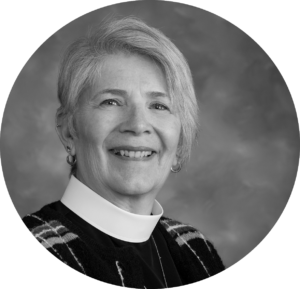The Rev. Terri C. Pilarski is an Episcopal priest serving in parish ministry for twenty years, and a licensed clinical social worker specializing in Bowen Family Systems Theory for Clergy and Congregations. She has been the rector of Christ Episcopal Church in Dearborn, MI for nine years, which was once the parish home of Henry and Clara Ford and their families. She’s been married for thirty-five years to Dan, and they have two grown children and two grandchildren as well as two dogs and two cats. She loves to exercise, is a lifetime practitioner of meditation (contemplative prayer), and knits to relax. She is a poet and storyteller through social media and photos, telling stories of life, love, and faith.
Question: Describe something in your life that you were not aware of before Faithwalking (FW). What was the impact of that lack of awareness in your life?
Answer: Although I have done significant work to understand my life and what drives me, consciously and unconsciously, I learned a lot about myself from the concept of “negative” vows and first formation. Negative vows are the idea that something happened to me in my childhood (first formation) from which I made a meaning that informed (subconsciously) my future thoughts and actions but are untrue. That through awareness of the event and the meaning I made, which was not true about me, I could change that meaning into something that was more honest and true, has enabled me to be more comfortable in my own skin and more at peace with who I am.
Q: Tell us about you. Who are you? How did you connect with FW?
A: I am an Episcopal priest who has worked with Bowen Family Systems Theory for twenty years, having first studied it for my MSW degree in the 1990s. As part of my continuing ed work to increase my effectiveness as a priest, I attended the Lombard Mennonite Peace Center’s Clergy Clinic in Lombard, IL. There I met Jim Herrington, a founding member of Faithwalking, and his presentation intrigued me. I contacted Faithwalking and arranged for a presentation for my parish, and from there I took the online courses. These have changed my life for the better, in countless ways.
Q: What has changed through FW? How are you different?
A: Although I have studied Bowen’s Family Systems Theory (BFST) for many years, Faithwalking helped to make the theory practical and applicable. Faithwalking utilizes more approaches than just BFST to create an effective approach to leadership and discipleship that has given me peace and confidence in all aspects of my life.
Q: Describe the vision you have of your best self.
A: I am living into my vision of my best self as someone who is fully aware and centered in her values and beliefs which are grounded in love of God, love of self, and love of neighbor. To this end I am actively engaging in deepening my intercultural competency and adaptability so that I can be more aware and effective in relationship building across the spectrum of humanity. I live in a very diverse community, and being an effective member of and leader in this community asks me to be aware and adaptive. I do this while also staying really clear about who I am and what I believe.
Q: Describe the vision you have for FW in 5 years.
A: I talk about Faithwalking all the time and to many people I meet. I hope more people are drawn to the profound, life inspiring work of wholeness that FW offers.
Q: What was the most helpful tool you learned in FWF?
A: The process of becoming really clear on my guiding principles so that I am confident in living from them.






